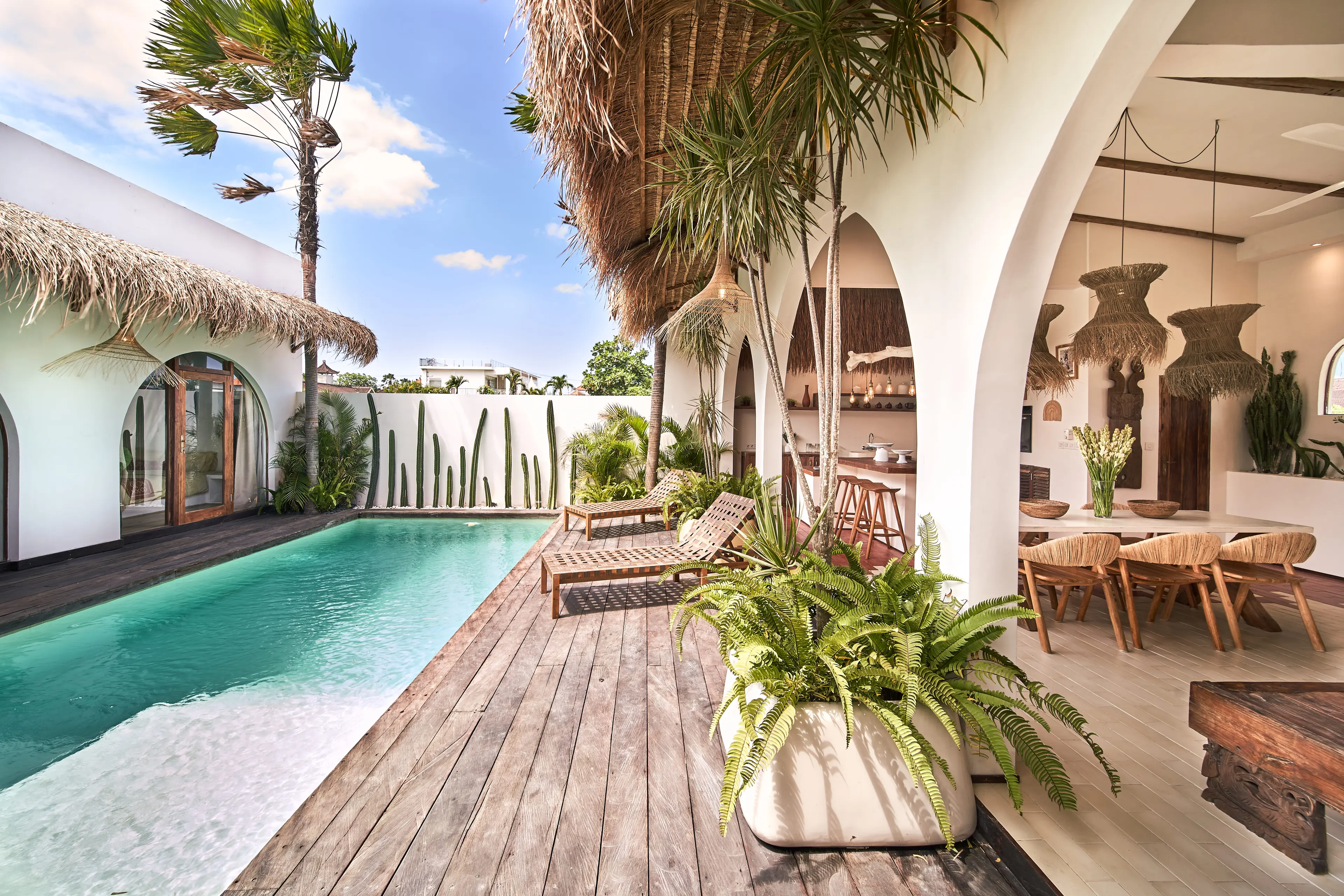Your $200,000 Goes Further in Paradise Than You Think
While $200,000 might barely secure a parking space in Paris or a studio apartment in Sydney, this same budget could unlock your investment dreams on the paradise island of Bali. Imagine owning a beautiful villa overlooking emerald rice fields, generating passive income while your property appreciates in one of Southeast Asia's most dynamic real estate markets.
If you're an investor with solid savings of around $200,000, you have more options than you might think. While this budget range won't offer the unlimited choices available to ultra-high-net-worth investors (which we'll cover in an upcoming article), it provides enough flexibility to build a profitable real estate portfolio in Bali.
In this comprehensive guide, we'll explore six strategic investment pathways tailored specifically for the $200,000 budget range, complete with realistic ROI expectations, risk assessments, and expert insights from our experience in Bali's property market.
1. Investing in an Existing 1-2 Bedroom Villa: The Straightforward Entry Point

The Strategy
This is the most direct route into Bali's rental villa market. With a $200,000 budget, you can purchase a turnkey property that's already generating income, allowing you to start earning returns immediately.
What Your Budget Gets You
- In Ubud: A well-appointed 2-bedroom villa in one of Bali's cultural hotspots, popular with wellness travelers and digital nomads
- In Uluwatu: A stylish 1-bedroom villa in this surfer's paradise, though perhaps not in the most premium cliff-top locations
- In Canggu or Seminyak: A compact 1-bedroom villa within walking distance of beaches, cafes, and coworking spaces
Location Considerations
While your exact location choice depends on your investment strategy, the key is understanding the rental market dynamics of each area. Ubud attracts longer-term stays and wellness tourists, Uluwatu draws surfers and couples seeking clifftop sunsets, while Canggu appeals to the digital nomad community.
The Numbers That Matter
When evaluating existing villa investments, always request comprehensive rental history and financial documentation. You should expect:
- Minimum acceptable ROI: 10% annually
- Target ROI range: 10-13%
- Occupancy rates: Historical data for at least the past 12-24 months
- Operating expenses: Management fees, maintenance, utilities, and property taxes
Expert Tip: Never settle for an ROI below 10% in this category. If the numbers don't meet this threshold, either negotiate the purchase price down or walk away. Working with a reputable agent like Tipi Estate ensures you receive accurate rental projections and avoid costly mistakes that could significantly impact your returns.
Investment Profile
- ROI: 10-13% annually
- Risk Level: Low
- Involvement Required: Low (typically managed by property management companies)
- Return Timeline: Immediate income generation
2. Investing in an Off-Plan 1-2 Bedroom Villa: The Appreciation Play

The Strategy
Off-plan investing means purchasing a property before or during construction, typically at a 20-30% discount compared to completed villas. This discount accounts for the "unrealized revenues" during the construction period when the property isn't generating rental income.
Why Off-Plan Can Be Lucrative
The real magic of off-plan investing happens in emerging markets. As your villa is being constructed, the surrounding area may be developing rapidly—new restaurants opening, improved infrastructure, increased tourism—all of which drives property values upward. By the time your villa is completed, it may already be worth significantly more than your purchase price.
Prime Areas for Off-Plan Investment
Look for up-and-coming regions where development is accelerating:
- Bingin and Padang Padang: Next to Uluwatu, gaining popularity
- Pererenan: The "new Canggu" with more affordable prices
- Sanur: Experiencing a renaissance with younger demographics
- North Bali (Lovina, Amed): Emerging markets with significant growth potential
Essential Due Diligence
Off-plan investing carries more risk than purchasing existing properties, so thorough research is critical:
- Developer Research: Google the developer's name and look for reviews, completed projects, and any red flags
- Track Record: Visit their previous developments to assess construction quality and design
- Proven Returns: Request rental performance data from their completed projects
- Legal Review: Engage an experienced property lawyer to review all contracts and payment structures
- Payment Schedule: Understand the payment milestones and what happens if delays occur
At Tipi Estate, we happily provide free "go" or "don't go" assessments on developers and off-plan projects—contact us for unbiased advice before committing your capital.
Investment Profile
- ROI: 12-18% annually (once operational)
- Risk Level: Medium
- Involvement Required: Low to Medium (monitoring construction progress)
- Return Timeline: Short to medium term (18-36 months until completion)
3. Building Your Own 2-3 Bedroom Villa: The Developer's Path
The High-Risk, High-Reward Option
Building your own villa essentially means becoming your own developer—a potentially lucrative but challenging path that can deliver the highest returns of all options on this list.
Who Should Consider This?
WARNING: This strategy is not for everyone. You should only consider building if:
- You currently live in Bali or plan to relocate immediately
- You have significant time to dedicate to the project (this becomes your full-time job)
- You have patience for bureaucratic processes and construction delays
- You're comfortable managing multiple contractors and consultants
- You have local connections or are willing to build them
The Upside: Maximum Returns
When executed successfully, building your own villa can generate returns of 15% or higher because you're eliminating the developer's markup and creating exactly what the market demands.
The Downside: Everything Else
The risks and challenges are substantial:
- Land Access Issues: Purchasing land without proper road access or legal easements
- Contractor Problems: Workers disappearing mid-project or delivering substandard work
- Market Misalignment: Designing a villa that doesn't appeal to renters or buyers
- Permit Complications: Navigating Indonesia's complex building regulations
- Budget Overruns: Construction costs exceeding initial estimates
- Timeline Delays: Projects taking 6-12 months longer than planned
The Team You'll Need
If you proceed down this path, assemble a comprehensive team:
- Real estate agent (for land acquisition and market insights)
- Property lawyer (for contracts and legal compliance)
- Main contractor and subcontractors
- Permit consultants (IMB and other required approvals)
- Architect (who understands local building codes)
- Structural engineer
- Interior designer (familiar with vacation rental aesthetics)
Our Honest Recommendation: Unless you have construction experience or have successfully completed similar projects, we advise against this option. However, if you're determined to pursue it, speak with as many professionals as possible before breaking ground. At Tipi Estate, we can connect you with trusted local experts who can guide you through the process.
Investment Profile
- ROI: 15%+ annually (potentially much higher)
- Risk Level: Very High
- Involvement Required: Very High (full-time commitment)
- Return Timeline: Medium term (2-3 years until operational and stabilized)
4. Investing in a Piece of Land: The Land Banking Strategy
Understanding Land Banking
Land banking involves purchasing raw land in emerging markets and holding it for long-term appreciation. This is a passive investment strategy that bets on future development and area growth.
The Critical Rule: Freehold Only
If you're investing in land alone, freehold ownership is essential. Here's why:
- Leasehold land depreciates as the lease term diminishes, meaning you lose value over time
- Freehold land appreciates with market growth and area development
- Leasehold makes sense only when you're building and generating rental income to offset the lease depreciation
Target Markets for Land Banking
Focus on emerging regions where infrastructure development and tourism growth are anticipated:
- Medewi: West Bali's developing surf destination
- Amed: East Bali's diving and snorkeling hub
- Tabanan: Rice terrace regions gaining eco-tourism traction
- North Bali coastal areas: Lovina and surrounding beaches
The Reality Check
Land banking isn't for everyone. Consider these factors:
- No guaranteed returns: Unlike rental villas, land generates no income
- Long hold periods: Markets may take 5-10+ years to mature significantly
- Liquidity challenges: Selling land can be difficult, especially in less developed areas
- Capital immobilization: Your money is tied up for extended periods
Ideal Investor Profile
This strategy works best for:
- Experienced investors with diversified portfolios
- Those who already have active income-generating investments in Bali
- Investors with patient capital who don't need immediate returns
- Individuals who can afford to hold assets long-term
Investment Profile
- ROI: Highly variable; potential for 100%+ appreciation over 5-10 years
- Risk Level: High (due to market uncertainty and liquidity issues)
- Involvement Required: Relatively low (periodic monitoring)
- Return Timeline: Long to very long term (5+ years)
5. Co-Investing in a Larger Project: Pooling Resources for Premium Opportunities
The Power of Partnership
If you can assemble a group of 4-5 trusted investors, your collective $800,000-$1,000,000 budget unlocks significantly more lucrative opportunities that wouldn't be accessible individually.
What Becomes Possible
With a larger pooled budget, you can invest in:
- Boutique Resorts: 8-12 villa properties with shared amenities
- Luxury Multi-Bedroom Villas: 6+ bedroom properties commanding premium nightly rates
- Villa Developments: Multiple units generating diversified income streams
- Commercial Properties: Retail spaces in high-traffic tourist areas
The Benefits
- Higher ROI potential: Premium properties typically generate better returns
- Diversification: Spread risk across multiple units or property types
- Professional Management: Larger projects often have sophisticated management structures
- Economies of Scale: Lower per-unit costs for maintenance, marketing, and operations
Critical Success Factors
Co-investment requires:
- Trusted Partners: Only invest with people you know well and trust completely
- Clear Legal Structure: Establish a legal entity (PT PMA or other structure) with defined ownership percentages
- Decision-Making Framework: Document how decisions are made, especially regarding sales, refinancing, or major renovations
- Exit Strategy: Define how partners can exit the investment and at what terms
- Professional Guidance: Always engage both a property lawyer and real estate agent to review the opportunity
Tipi Estate can help: We specialize in analyzing co-investment opportunities, verifying projected returns, and ensuring all partners understand the risks and potential rewards.
Investment Profile
- ROI: Variable depending on project (often 12-20%+)
- Risk Level: Medium (varies by project quality and partner reliability)
- Involvement Required: Usually low for passive investors; higher if actively managing
- Return Timeline: Varies by project type (short to long term)
6. Investing in a Local Business: The Active Entrepreneur's Choice

Beyond Real Estate
For expats currently living in Bali or planning to relocate, investing in an operating business presents an alternative investment vehicle that combines income generation with lifestyle integration.
What's Available
Bali's business marketplace offers diverse opportunities:
- Cafes and restaurants in tourist hotspots
- Beach clubs and bars
- Retail boutiques selling fashion, jewelry, or home decor
- Wellness centers and yoga studios
- Coworking spaces
- Barber shops, tattoo parlors, and beauty salons
- Tour and activity businesses
Many owners sell turnkey businesses with established customer bases, trained staff, and proven systems.
The Reality of Business Ownership in Bali
This is not passive income. Running a business in Bali requires:
- Deep understanding of local culture and business practices
- Ability to work with Indonesian staff and navigate language barriers
- Constant attention to operations, quality control, and customer service
- Adaptation to seasonal tourism fluctuations
- Compliance with ever-changing business regulations
Success Factors
Bali's low barriers to entry mean fierce competition. New businesses open daily, but many also close within their first year. To succeed:
- Industry Experience: Ideally, invest in a sector you understand
- Market Research: Thoroughly analyze the competitive landscape
- Operational Excellence: Even with a manager, stay actively involved
- Financial Discipline: Maintain strict control over expenses and cash flow
- Cultural Adaptation: Respect local customs and build genuine relationships with staff
The Management Question
While hiring a manager is possible, never become completely hands-off. Regular oversight is essential to prevent:
- Financial mismanagement or theft
- Quality deterioration
- Customer service issues
- Staff turnover and morale problems
Investment Profile
- ROI: Highly variable depending on business type and execution
- Risk Level: Medium to High
- Involvement Required: YOUR LIFE (daily operational oversight)
- Return Timeline: Medium term (12-24 months to profitability and stabilization)
Investment Comparison Table
To help you evaluate which strategy aligns with your goals, risk tolerance, and lifestyle, here's a comprehensive comparison:
Making Your Decision: Key Considerations
Before committing your $200,000 to any Bali investment, ask yourself:
- What's my primary goal? Immediate income, long-term appreciation, or lifestyle integration?
- What's my risk tolerance? Can I handle market fluctuations and potential losses?
- How much time can I dedicate? Am I looking for passive income or an active project?
- What's my investment timeline? Do I need returns quickly or can I wait years?
- Am I working with trusted professionals? Do I have an experienced agent, lawyer, and local advisors?
Special Opportunity: Investment Options Under $100,000
For investors with smaller budgets (under $100,000), opportunities still exist. Tipi Estate has partnered with select developers offering investment-grade lifestyle apartment complexes within this price range. These units typically feature:
- Prime locations in Canggu, Seminyak, or Ubud
- Professional management and rental programs
- ROI potential of 8-12%
- Lower entry point for first-time Bali investors
Important: These opportunities sell out very quickly due to limited inventory and strong demand. Contact us immediately if you're interested in learning more about current availability.
Your Next Steps: Partner with Tipi Estate
Investing in Bali's real estate market with $200,000 opens multiple strategic pathways, each with unique advantages and considerations. Whether you're drawn to the immediate returns of an existing villa, the appreciation potential of off-plan investing, or the lifestyle integration of a local business, success requires local expertise, thorough due diligence, and professional guidance.
At Tipi Estate, we've helped countless investors successfully navigate Bali's property market. Our team offers:
- Unbiased Developer Assessments: Free "go" or "don't go" recommendations on off-plan projects
- Accurate Financial Projections: Real rental data and conservative ROI estimates
- Local Market Intelligence: Insights into emerging areas and investment trends
- Professional Network: Connections to trusted lawyers, contractors, and consultants
- Personalized Strategy Sessions: Tailored advice based on your specific goals and constraints
Don't navigate Bali's real estate market alone. Small mistakes can cost you thousands of dollars and years of frustration. Let Tipi Estate's expertise guide you toward a profitable, secure investment that aligns with your financial goals.












